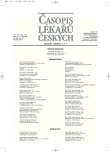-
Medical journals
- Career
Changes of Plasminogen Activator Inhibitor (PAI-1) During Estrogen Replacement Therapy
Authors: Z. Žižka; Tomáš Fait; M. Vráblík 1
Authors‘ workplace: Gynekologicko-porodnická klinika 1. LF UK a VFN, Praha ; III. interní klinika 1. LF UK a VFN, Praha 1
Published in: Čas. Lék. čes. 2007; 146: 874-877
Category: Original Article
Overview
Background.
The purpose of the present study was to determine changes of plasminogen activator inhibitor – 1 (PAI-1) as biochemical cardiovascular risk factor during the use of different administration methods in the early estrogen replacement therapy.Methods and Results.
In a 12-week prospective, randomized, interventional, cross-over trial, oestradiol was administered orally in a dose of 2 mg daily or transdermally in a dose of 0.05 mg daily. Forty-five healthy postmenopausal women were included into the study within 12 weeks after the hysterectomy and ovariectomy (surgical castration). Forty-one women completed the study and their data were analyzed. The average age was of 49±6 years. PAI-1 was determined by bioimmunoassay (ChromolyzeTM PAI-1). The PAI-1 level decreased statistically significantly (p = 0.001) after the oral oestrogen therapy from 11.39±12.02 IU/l to 5.0±5.27 IU/l. Changes are also significant compared with non-significant changes after the transdermal therapy.Conclusions.
The oral therapy reduced statistically significantly PAI-1 levels compared with the transdermal method of administration. This change is beneficial from the view of cardiovascular risk.Key words:
Estrogen replacement therapy, cardiovascular risk, PAI-1.
Labels
Addictology Allergology and clinical immunology Angiology Audiology Clinical biochemistry Dermatology & STDs Paediatric gastroenterology Paediatric surgery Paediatric cardiology Paediatric neurology Paediatric ENT Paediatric psychiatry Paediatric rheumatology Diabetology Pharmacy Vascular surgery Pain management Dental Hygienist
Article was published inJournal of Czech Physicians

-
All articles in this issue
- The Importance of Screening for Thyroid Dysfunction During Pregnancy: Pathophysiological Background and Practical Implications
- Reflection on the Physiological Mechanisms of Movements Controlled by the Spinal Cord – Brain Interaction
- Nutrigenetics and Nutrigenomics
- The Interpreter Role of Clinical Geneticist in the Process of Genetic Testing
- Silent Ischemia and Noisy Stunning: A Perspective of the Cause and Hints of Associations
- Thromboembolism in Pregnancy – Physiology and Pathophysiology of Hemocoagulation Changes During Normal and Pathological Gravidity
- Milestones of Cardiovascular Therapy. V. Diuretics
- Significance of Serum Antibodies ANCA, ASCA, ABBA in Diagnostics of Idiopathic Intestinal Inflammations
- Pilot Study to Evaluate Blood Glucose Control by a Model Predictive Control Algorithm with Variable Sampling Rate vs. Routine Glucose Management Protocol in Peri- and Postoperative Period in Cardiac Surgery Patients
- Changes of Plasminogen Activator Inhibitor (PAI-1) During Estrogen Replacement Therapy
- Tachycardia-Induced Cardiomyopathy
- Repeated Thrombosis of the Mechanical Heart Valve Prosthesis
- Journal of Czech Physicians
- Journal archive
- Current issue
- Online only
- About the journal
Most read in this issue- Significance of Serum Antibodies ANCA, ASCA, ABBA in Diagnostics of Idiopathic Intestinal Inflammations
- Nutrigenetics and Nutrigenomics
- Thromboembolism in Pregnancy – Physiology and Pathophysiology of Hemocoagulation Changes During Normal and Pathological Gravidity
- Changes of Plasminogen Activator Inhibitor (PAI-1) During Estrogen Replacement Therapy
Login#ADS_BOTTOM_SCRIPTS#Forgotten passwordEnter the email address that you registered with. We will send you instructions on how to set a new password.
- Career

